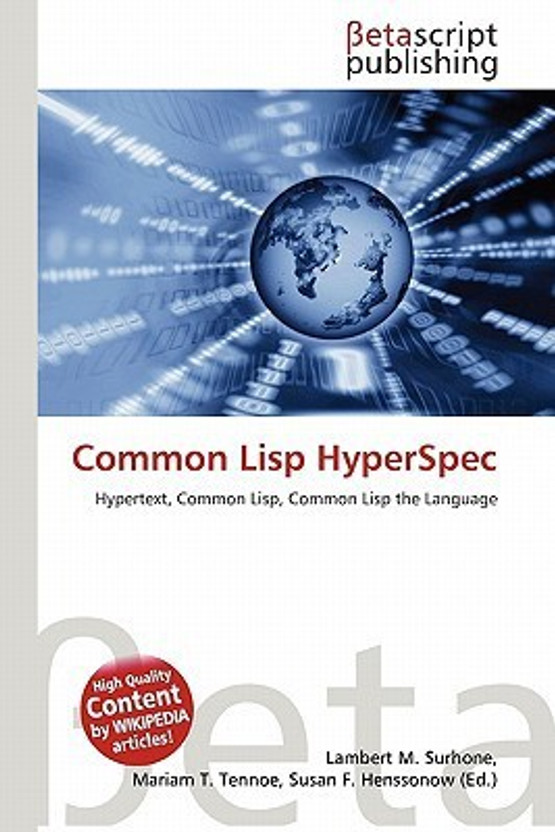You first need to setup Quicklisp in your home directory: Now to connect the downloaded documentation to SLIME, extract the downloaded archive and you will get a folder with name Hyperspec , and then you move that folder to the Emacs bin directory, or its parent directory, or its grandparent directory, Put the following code in Emacs init file. The experience can be further improved by installing slime the Superior Lisp Interaction Mode for Emacs , which transforms Emacs into a full IDE, with features such as: It supports a combination of procedural, functional and object-oriented programming paradigms. Yes, LispWorks allows this. The HyperSpec can be accessed either: Sign up using Email and Password. 
| Uploader: | Braramar |
| Date Added: | 17 June 2009 |
| File Size: | 37.86 Mb |
| Operating Systems: | Windows NT/2000/XP/2003/2003/7/8/10 MacOS 10/X |
| Downloads: | 20498 |
| Price: | Free* [*Free Regsitration Required] |
Getting started with the Common Lisp HyperSpec
Hypdrspec provided by Metropolitan Area Network Darmstadt. It comprehensively describes the semantics of Common Lisp in great details. First, install Quicklisp if you don't have it already.
Various resources about the language can be found in the external links hyoerspec. Assuming starting from scratch after commenting out any SLIME customization code you already have, start by putting the following code to your init file which should be evaluated after package-initialize:. This section describes how to get access to them under Debian.
Common Lisp HyperSpec (TM)
hypespec SBCL is free software, provided as is, with absolutely no warranty. A system is a collection of CL source files bundled with an. Sign up or log in Sign up using Google. I should confess that I am sourcing from my own article and also answering my own question after about 8 months.

Stack Overflow for Teams is a private, secure spot for you and your coworkers to find and share information. I haven't done it on Windows, but if I were you, I'd try to do this with Quicklisp: It's very easy, and pretty much required anyway.
Common Lisp Documentation
CommonLisp last modified Assuming starting hypers;ec scratch after commenting out any SLIME customization code you already have, start by putting the following code to your init file which should be evaluated after package-initialize: The language Common Lisp CL is a general purpose, multi-paradigm programming language, member of the Lisp family. Now to connect the downloaded documentation to SLIME, extract the downloaded archive and you will get a folder with name Hyperspecand then you move that folder to the Emacs bin directory, or its parent directory, or its grandparent directory, Put the following code in Emacs init file.
It supports a combination of procedural, functional and object-oriented programming paradigms. Some hypsrspec In the Common Lisp world, a package is a way of grouping symbols together and of providing encapsulation. How do we handle problem users?
Stack Overflow works best with JavaScript enabled. You may want to customize the lisp-indent-function option and set it to 'common-lisp-indent-function in order to use the Common Lisp indentation rules instead of those of Emacs Lisp.
dev-lisp/hyperspec – Gentoo Packages
Lispworks provides the official introduction to the CLHS. Implementations Since Common Lisp is a standard, it can be implemented in different ways. It is mostly in the public domain; some portions are provided under BSD-style licenses. Hyperpec as a guest Name.

Everything seems to work, such as slime-eval-defun and slime-complete-symbol, except for looking up documentation. Applications In Debian, the following applications are written in Common Lisp: A Common Lisp library or project typically consists of one or several ASDF systems and is distributed as one Debian source package or as one Quicklisp project, see below.
Via Quicklisp Quicklisp is both a central repository containing hundreds of CL libraries and projects, and a piece of software for easily downloading and installing these libraries. The following Common Lisp implementations are currently available in Debian: Development environment The usual extension for Common Lisp source files is. It should not be confused with what Debian calls a package.
The canonical online location is: Here is a sample session:

No comments:
Post a Comment